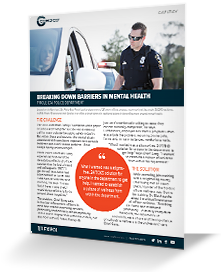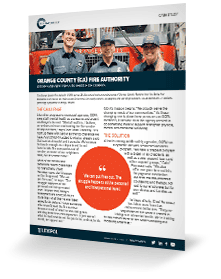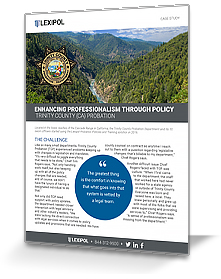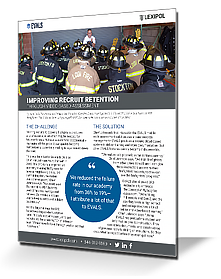The Challenge
The 2018 Ruderman Family Foundation white paper on police and firefighter suicide was a wake-up call for many outside the public safety industry. But within these professions, the mental strain associated with consistent exposure to traumatic incidents was a well-known problem—if not always openly acknowledged.
Pinole Police Chief Neil Gang experienced first-hand the devastating effects of officer suicide when he lost a friend and colleague in 1997. “I got the call that Asher had killed himself at 3 a.m. and I was back at work the next morning,” he says. “I knew that if I ever made chief, I would do something to try to prevent these tragedies.”
The problem, Chief Gang says, is that law enforcement officers in need have trouble accessing services, particularly confidentially and anonymously. This is due to stigma from within the culture, but also from without: “Many therapists just aren’t comfortable talking to cops; they are not culturally competent,” he says. Furthermore, employee assistance programs often exacerbate the problem, requiring phone calls, forms and, in many instances, weeks-long waits.
“What I wanted was a stigma-free, 24/7/365 solution for anyone in the department to to establish a culture of wellness from within the department,” says Chief Gang. “I wanted to establish a culture of wellness from within the department.”
The Solution
While attending joint training with a neighboring county, Chief Gang met Dr. David Black, founder of the Cordico officer wellness app. During the training, Dr. Black spoke about the critical importance of officer wellness. “Everything Dr. Black said resonated profoundly–culturally competent therapists, the importance of anonymity, ease of use and the importance of cultivating wellness in the profession,” says Chief Gang.
Cordico built a customized app for the Pinole Police Department (PPD), combining agency-specific resources with self-assessments, videos and guides developed by top first responder psychologists. The app includes one-touch dialing for officers in crisis and connects officers to the agency’s peer support team and vetted therapists.
“One of my favorite aspects of the app is its fluidity,” Chief Gang says. “It’s constantly updated and changing with what we are being challenged with and can take an officer from yoga techniques to doing a self-assessment for depression or compassion fatigue to finding a therapist, and much more. And when it gets updated, everybody talks about it. So, I know it’s being used.”
The Results
The introduction of the Cordico app has helped the PPD eliminate two of the biggest barriers to law enforcement officers seeking help: red tape and stigma.
“From the start, it was fully embraced,” Chief Gang says. “And I know it’s working. In fact, just the other day I had an officer thank me for it. Whenever this happens, I check in to make sure everything is okay with them. ‘Oh, I’m fine,’ they said, ‘but my friend is going through something and I was able to help her out with resources.’ That’s not at all uncommon now.”
Gang also says officers now routinely recommend therapists to each other. “I see it all the time. Someone is having marriage trouble and so they recommend the couples counselor who worked for them. My folks talk about these sorts of issues out in the open. There is no stigma.”
Just 10 years ago it would be inconceivable to imagine law enforcement officers embracing such concepts as yoga, mindfulness, and therapy. But for Chief Gang and the officers of the PPD, Cordico brings these concepts and related solutions to their fingertips—anonymously and around the clock.
With just 28 sworn officers, the PPD lacked resources to develop comprehensive mental and behavioral health resources on their own. Using the Cordico app, Chief Gang’s officers have access to a wellness toolkit that addresses more than 60 topics, from substance abuse to PTSD to family support. The app has proven so effective that Chief Gang included it as one of the elements of his seven-point approach to a culture of wellness, named the ASHER model in honor of the friend he lost many years ago.
“Cordico is a critical component of the culture of wellness I’m trying to support,” Chief Gang says. “In the event of a crisis, it will be there.”




